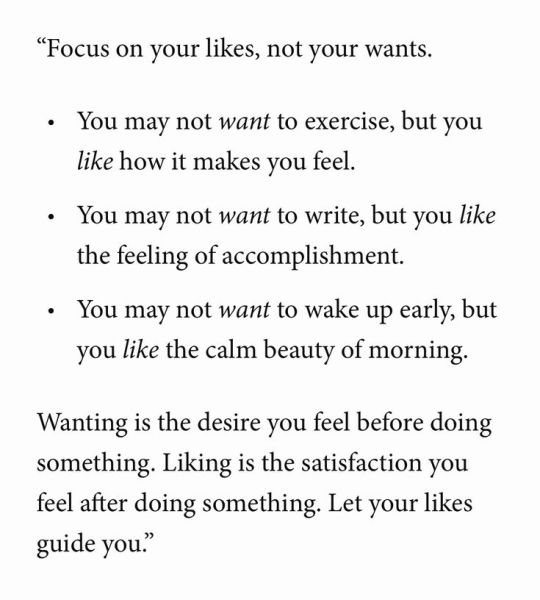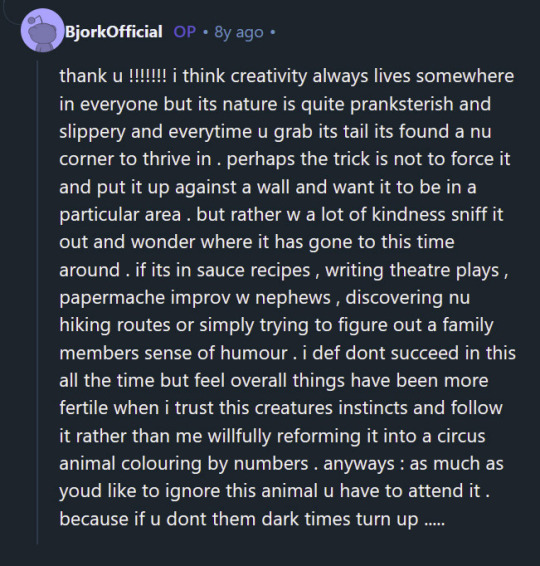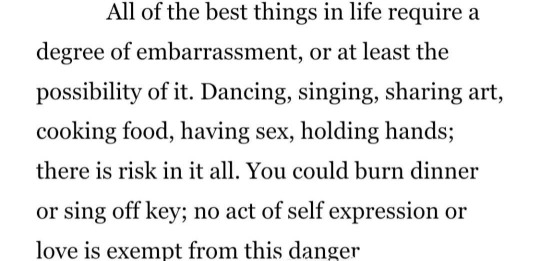Text
“Pillars and crossbeams can be used to ram down a wall, but not to plug a hole, for this requires a different kind of tool. A great stallion can gallop a thousand miles in a day, but it cannot catch mice as well as a cat, for that requires a different kind of skill. Kites and owls can catch a flea or discern the tip of a hair on a dark night, but in the daytime they are blinded and cannot even make out a mountain range, for that requires a different inborn nature. So if someone says, ‘Why don’t we make only rightness our master and eliminate wrongness, make only order our master and eliminate disorder?’ this is someone who has not yet understood the coherence of heaven and earth and the realities of the ten thousand things. That would be like taking heaven alone as your master and eliminating earth, or taking yin alone as your master and eliminating yang—an obvious impossibility. If someone nonetheless insists on talking this way, he is either a fool or a swindler.” - Zhuangzi 17, Autumn Waters
3K notes
·
View notes
Text
[“Take a moment to visualize a crouching cheetah, its eyes focused, its muscles twitching in anticipation, as it prepares to attack a swift, darting impala. I want you to track your own responses as you watch the sleek cheetah overtake its prey in a seventy-mile-an-hour surge of speed. The impala falls to the ground an instant before the cheetah sinks its claws into the haunches of its prey. It is almost as if the animal has surrendered itself to the predator and to certain death. However, the fallen impala is not dead. Although it appears limp and motionless, its nervous system is still highly charged from the swift chase. Though it is barely breathing or moving, the animal’s heart and brain are still racing. The same chemicals discussed earlier that helped fuel its attempted escape continue to flood its brain and body.
There is a possibility that the impala will not be devoured immediately. The mother cheetah may drag its (apparently dead) prey behind a bush, then go seek out its hungry cubs, safely hidden at a distance. While the cheetah is gone, the temporarily “frozen” impala may awaken from its state of shock, then shake and tremble in order to discharge the vast amount of energy it mobilized to escape death. After completing this normalization procedure, the impala will stand up on wobbly legs, take a few tentative steps, then bound off in search of the herd as if nothing unusual had occurred.
The “immobility response” used by the impala is just as important a survival tool as “fight” and “flight.” This normal survival strategy is also called the “freezing” response. Slow and relatively unprotected animals like the opossum use immobility as their first line of defense. Any animal that is trapped in a situation where fight and flight are not viable options will use it. Another of the vital functions of the immobility response is numbness. If the impala (or human) is killed while “frozen,” it will not suffer pain or even terror during its demise.
We humans use the immobility response — frozen energy — regularly when we are injured or even when we feel overwhelmed. Unlike the impala, though, we tend to have trouble returning to normal after being in this state. The very feelings that we need to access in order to us help steer ourselves back to the present are, in effect, numbed-out. This difficulty in normalizing ourselves is very important. I believe that the ability to return to equilibrium and balance, after using the “immobility response,” is the primary factor in avoiding being traumatized.
How do wild animals successfully return to their normal state? The answer lies in the particular type of spontaneous shaking, trembling, and breathing that I described earlier. I remember that when I shared my observations about animal behavior with Andrew Bwanali, chief park biologist of the Mzuzu Environmental Center in Malawi, Central Africa, he nodded excitedly, then burst out: “Yes … yes … yes! That is true. Before we release captured animals back into the wild, we make absolutely sure that they have done just what you have described.” He looked down at the ground, then added softly, “If they have not trembled and breathed that way before they are released, they will not survive. They will die.”]
peter levine, from healing trauma, 2008
200 notes
·
View notes
Text
what Work is the most important? the work you have to do next. narrow the scope of focus down to that singular glittering point.
15K notes
·
View notes
Text
We have a generation of writers who have watched more movies, television, and footage of human life than they have experienced of that life firsthand. Even their understanding and experience of their own inner lives originates in skits, memes, and video essays. They have no philosophers or prophets. They have YouTubers and influencers, and in this shallow, highly processed and highly mediated experience of consciousness, there is no thought. Merely the telepathic beaming of image from the screen to the interior of the person’s mind.
—Brandon Taylor, against casting tape fiction
794 notes
·
View notes
Text
audre lorde speaking about multiplicity of self:
I find I am constantly encouraged to pluck out some aspect of myself and present this as the meaningful whole, eclipsing or denying the other parts of self. But this is a destructive and fragmenting way to live. My fullest concentration of energy is available to me only when I integrate all the parts of who I am, openly, allowing power from particular sources of my living to flow back and forth freely through all my different selves, without the restrictions of externally imposed definition. Only then can I bring myself and my energies as a whole to the services of those struggles which I embrace as part of my living.
&
It has felt, at different points in my life, like every single way in which I would identify myself was in total conflict with every other way. First of all, there's always going to be some group or some person who wants you to talk from only one particular perspective. That's very destructive. It's like putting all the eggs in one basket. It also reduces you to one component, and it's just such a terrible injustice to all the other pieces of yourself. It cuts me off from the energy that comes from all those different pieces. So integration is absolutely necessary. I have to work on integration for myself. You have to do it for yourself. What I've learned, and this was indeed a learning process, is that it is absolutely essential not to allow pieces of myself to be at war with each other . . . But as long as you let yourself be baffled, as long as you let one piece of yourself be cancelled out by another, you will always be subject to the kind of turmoil that sucks energy away. It's hard, it's very hard. But it's not harder than the way they want us to live, which is in categories. And, it's far more productive.
929 notes
·
View notes
Text

from letters to a young poet by rainer maria rilke
1K notes
·
View notes
Text
been thinking about that apocryphal Jung quote re: haterism:
The world is full of people suffering from the effects of their own unlived life. They become bitter, critical, or rigid, not because the world is cruel to them, but because they have betrayed their own inner possibilities. The artist who never makes art becomes cynical about those who do. The lover who never risks loving mocks romance. The thinker who never commits to a philosophy sneers at belief itself. And yet, all of them suffer, because deep down they know: the life they mock is the life they were meant to live.
2K notes
·
View notes
Text
what Work is the most important? the work you have to do next. narrow the scope of focus down to that singular glittering point.
15K notes
·
View notes
Text
Sorry to break it to you but you literally have to face your fears and slaughter them. Otherwise you will live a small life that you do not want. You literally have to view your biggest fears and attack them head on. You have to fall into the abyss to find your way out. The easy path does not exist. There is no get out of jail free card. You have to allow yourself to die a spiritual death over and over again in order to reinvent yourself into the person you are actually supposed to be. And you have to be painfully honest with yourself and the people around you. It’s horrible but it’s truly the only way.
78K notes
·
View notes
Text
"All I do know is as we age, the weight of our unsorted baggage becomes heavier. With each passing year, the price of our refusal to do that sorting rises higher and higher...Long ago, the defenses I built to withstand the stress of my childhood, to save what I had of myself, outlived their usefulness, and I've become an abuser of their once lifesaving powers. I relied on them wrongly to isolate myself, seal my alienation, cut me off from life, control others, and contain my emotions to a damaging degree. Now the bill collector is knocking, and his payment'll be in tears."
- Bruce Springsteen
5K notes
·
View notes
Text
There is a very simple secret to being happy. Just let go of your demand on this moment. Any time you have a demand on the moment to give you something or remove something, there is suffering. Your demands keep you chained to the dream state of conditioned mind. The problem is that when there is a demand, you completely miss what is now. Letting go applies to the highest sacred demand, and even to the demand for love. If you demand in some subtle way to be loved, even if you get love, it is never enough. In the next moment, the demand reasserts itself, and you need to be loved again. But as soon as you let go, there is knowing in that instant that there is love here already. The mind is afraid to let go of its demand because the mind thinks that if it lets go, it is not going to get what it wants - as if demanding works. This is not the way things work. Stop chasing peace and stop chasing love, and your heart becomes full. Stop trying to be a better person, and you are a better person. Stop trying to forgive, and forgiveness happens. Stop and be still.
Emptiness Dancing
Adyashanti
3K notes
·
View notes





